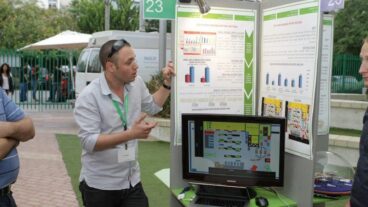Most beginning surgeons now sharpen their technique by practicing on real patients.For years airplane pilots have trained on flight simulators in addition to flying thousands of hours under a senior pilot’s supervision before they’re allowed to take over full command of an airliner.
But surgeons, who have similar levels of responsibility for human life, must practice the hands-on portion of their craft on living human beings right from the start after studying surgical procedure from books and observing senior practitioners perform.
Now a group of entrepreneurs with a six-year-old startup called Simbionix, now based in Cleveland, Ohio, is aiming to change all that with a surgical simulator they invented in a business incubator in Israel.
The device allows physicians to practice endoscopic examinations and surgery without fear of harming a patient. The software for the computer-based simulator was designed after surveying a worldwide group of master surgeons about their techniques. Students work on a specially designed mannequin using an endoscope, a surgical probe that is inserted into the mouth or rectum to survey and operate on the gastro-intestinal tract, and receive computer-generated images on a TV screen of what they are doing via sensors located in the probe.
The images generated by the software are realistic and when the physician makes a wrong move, he or she gets feedback in the form of noises made by the simulator. The simulator, known as a GI-Mentor, also produces an evaluation of the “operation” when the procedure is completed.
A wrong move by a novice surgeon on real person can cause internal bleeding. In order to stop the bleeding doctors must then dispense with the endoscope and cut open the body to staunch the bleeding, resulting at the very least in a longer hospital stay and a much longer recovery period for the patient.
“It’s easy to lose orientation when you’re working with a small tube in the body and watching a monitor,” said David Barkay, Simbionix’ 44-year-old founder. “With the simulator, you can learn from your own mistakes without putting a human being in danger.”
Simbionix has sold 41 of the gastro-intestinal medical simulators in the United States and about 130 worldwide so far, mostly to teaching hospitals. But the company’s long-term goal is to get physician-credentialing groups, such as the American College of Surgeons, to allow operations done on a simulator to count towards physician-licensing requirements. At the present time, doctors are required to perform 160 to 180 examinations and surgeries under the eye of a master surgeon before they are allowed to operate on their own.
“Early results of studies have shown that students who learn surgical procedures on simulators learn faster than those who learn the traditional way,” said Charles Steiner, the director of product development with the Minimally Invasive Surgery Center at the Cleveland Clinic, a teaching hospital in Cleveland. “Right now a simulator is the only device that actually measure a surgeon’s dexterity. There is only a written analysis by a peer that says you are up to the task.”
Acceptance by those in charge of physician credentialing may be necessary for Simbionix to really hit it big in terms of sales, Steiner said. Even greater success would come if the Simbionix devices were accepted as the benchmark that all simulators needed to reach after the credentialing organizations recognized them.
At the present time, Simbionix has the most simulators in operation worldwide, but it has competitors, including Immersion Medical of Gaithersburg, Md., and Mentice Corp. of Gothenburg, Sweden.
Barkay and partners Ran Bronstein and Edna Chosack, all Israelis, founded Simbionix in 1997 after working at Applitech, a company that manufactures and sells endoscopic cameras, in Holon, outside of Tel Aviv.
“We asked people we were working with what they thought of the idea (of simulators) and we determined there was a very strong need and then the question became how and where to do it,” said Barkay, who immigrated to Israel from France with his parents when he was 11. “Israel has a real advantage with a high-level, high-profile group of software engineers and mathematicians and a well-proven incubator system.”
Simbionix has received startup financing from Koor VC, a subsidiary of Tel Aviv-based Koor Industries and more recently received $1 million in funding from Cook Inc., a private holding company in Bloomington, Ind.
The GI-Mentor, for the gastro-intestinal tract, sells for between $30,000 and $50,000 depending upon the software. Simbionix will launch its second product, which simulates examinations and surgery of the urinary tract, in June 2002. A third product, to be known as the LAP-Mentor, will do the same for laparoscopy, the difficult technique of performing surgery using probes inserted through small, minimally invasive incisions in the body. Making small incisions rather than large ones minimizes recovery time, complications, and length of hospital stays following surgery.












